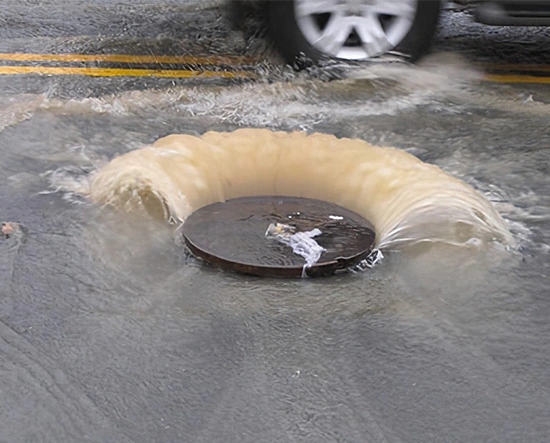 Add My Company
Add My Company
Sign In

Stormwater overflow is a severe environmental issue. It can lead to water pollution from waste matter, sewage and contaminated water in rivers, lakes and ponds. It could also cause severe damage to the public surroundings, especially during flooding. Stormwater overflow can create a significant problem that results in a series of damages and a major threat to the environment.Overflow makes the soil unsuitable for human activities and could attract mosquitoes which spread disease.Are Your Stormwater Drains Overflowing?Book A Drainage Engineer Today
0800 612 8038
What is stormwater overflow?Storm Water Overflow (SWO) is a natural phenomenon that occurs when rainwater cannot be absorbed into the ground fast enough, so it flows over land where it may pick up pollutants like oil or chemicals from roads or parking lots. This polluted water runoff has no place to go except into our water bodies like rivers and lakes, where it causes harm to fish and other aquatic life forms by increasing the turbidity (cloudiness) of the water.How can SWO be dangerous?SWOs are always an environmental concern as they affect aquatic life forms such as fish which live in rivers or lakes by increasing the turbidity of their habitats due to high levels of dissolved solids.Water pollution from waste matter is caused by the discharge of raw sewage into natural waters by overflowing drains or sewers, as well as by leakage from septic tanks and cesspits. The waste material could include domestic sewage, industrial effluent, agricultural runoff (fertilizers) and urban stormwater runoff. Sewage contains bacteria that can cause diseases like cholera and typhoid fever.Sewage and contaminated water into rivers, lakes and ponds.A sewage backup is one of the major causes of stormwater overflow. When it rains heavily, storm drains are unable to carry away all the rainwater that flows down from your roof or driveway. The extra water flows into the street, where it combines with other storm drains, causing them to overflow. Once this happens, raw sewage or contaminated water can flow directly into nearby streams or rivers without treatment. This can have a devastating effect on those living downstream from these areas as well as wildlife in those rivers and lakes because they would be exposed to harmful bacteria and viruses from the sewage.Causes of Storm Water OverflowThe leading causes of stormwater overflow are:1. Severe weather conditions could lead to sewage backup. When it rains heavily, the water levels in rivers, lakes and ponds will rise above normal levels. Rainwater will then flow through the drains into the sewer system. This is not a severe issue because it only happens when there is heavy rain.2. Large volumes of stormwater in urban areas can cause flooding and lead to overflow of sewage pipes. This occurs when there is a blockage in the pipe, which causes pressure buildup on both ends of the pipe. This pressure buildup results in pushing waste matter out of the pipes into open spaces such as parks and gardens around homes.3. Pipes are made of cheap material that can’t handle pressure. Just like any other piece of equipment, pipes need to be made from materials that can withstand the pressure they will be subjected to. If you have old pipes or ones that were poorly installed, they may not be able to hold up under pressure.4. The pipes were not maintained properly. As with any piece of equipment, if you don’t maintain it regularly, it won’t work as well as it should — or at all! If you don’t clean out your drains every few months and replace any damaged parts, then there’s no way for them to function properly if an overflow occurs.How to Prevent Stormwater OverflowFollowing are the most common methods for preventing stormwater runoff include:• Installing vegetated areas or rain gardens to absorb rainwater, so it doesn’t run off into the street or drain system.• Using treatments like bioswales to slow down the flow of water before it reaches the drain system.• Installing permeable pavement that allows rainwater to soak into the ground rather than running off quickly into a drain system.• Installing rain barrels on rooftops to collect water for lawns and gardens.• Using green roofs with plants that absorb rainwater, slow down runoff and cool urban areas.• Using porous concrete in parking lots and driveways that allow water to seep through rather than run off quickly into drains.• Placing water-absorbing bricks in the landscaping instead of using mulch or gravel that absorbs only limited amounts of water before becoming saturated and stopping absorption altogether.Are Your Stormwater Drains Overflowing?Book A Drainage Engineer Today
0800 612 8038
Contact Drain 247 for Emergency Flood Response & Cleanup ServiceWhen it comes to managing our environment, stormwater overflow is a major culprit. Not only does it causes water pollution, but it also leads to structural damage to infrastructure and the surrounding environment. Poor drainage systems, unsound construction, and negligent management are some of the main reasons why stormwater overflow happens. To prevent it from happening in the future, make sure you read up on these topics and take appropriate preventive measures.If you require Emergency Flood Response & Cleanup Service, get in touch with our drainage engineers today on 0800 612 8038.
For more information on Why Do Storm Water Overflows Affect The Environment? talk to Drain 247
Enquire Now
More Blogs
List your company on FindTheNeedle.

